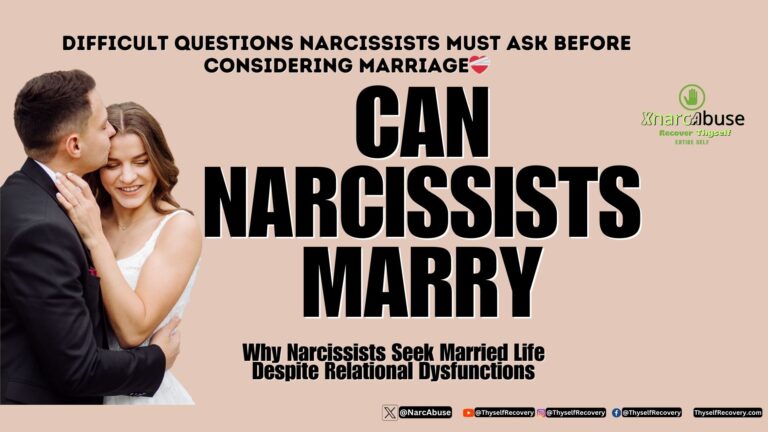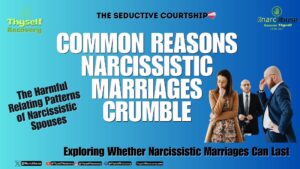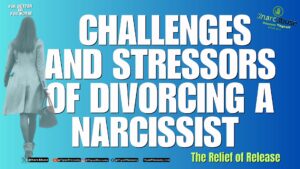Can Narcissists Marry?
Narcissistic personality disorder manifests in patterns of exaggerating one’s own importance and achievements, excessive need for admiration, and lack of empathy. This raises questions about whether narcissists have the capacity to healthily sustain marriage long-term. While some narcissistic traits exist on a spectrum in the general population, full-blown clinical narcissism poses significant challenges in intimate relationships. However, with self-awareness, outside intervention, and concerted effort, some narcissists may be able to improve their relating style enough to uphold marital duties ethically. But without proper treatment and accountability, the prognosis for narcissistic individuals remaining in healthy, thriving marriages appears poor.
The Narcissist’s Alluring Courtship Mask
When pursuing romantic partners, narcissists often employ seductive behaviors and manipulation tactics, including:
- Love bombing – overwhelming them with flattery, gifts, texts, attention to quickly secure their affection.
- Mirroring – imitating their interests, values, goals, and mannerisms to establish false chemistry.
- Future faking – making amazing promises about their shared future including marriage, children, etc.
- Idealizing – describing them and the new relationship in unrealistic, magical terms.
This powerful charm offensive conceals the narcissist’s true deficient and disordered personality lurking underneath their appealing façade.
Why Narcissists Seek Marriage Despite Relating Limitations
Despite relating pathologies, narcissists eagerly pursue marriage for reasons like:
- Securing a primary, compliant source of narcissistic supply in the form of praise, adoration, validation, domestic services, passion, social status, and reflected glory.
- Maintaining their falsely constructed public image of being an ideal, enviable spouse and family person.
- Exploiting their spouse’s assets and resources for personal gain.
- Possessing a loyal audience captive within the marriage for their endless self-focus and narcissistic diatribes.
- Sadistically dominating, controlling, and manipulating their spouse to feed their power-hungry egos.
This reveals narcissists’ core motivations for marrying are deficient and rooted in exploitation rather than authentic love and intimacy.
The Narcissist Spouse’s Relating Patterns
Once married, relating patterns typical of narcissists include:
- Constant demands for attention and validation from their spouse.
- Devaluing their spouse through criticism, superiority displays, comparisons to others.
- Emotional manipulation tactics like gaslighting, triangulation, guilt trips, and raging fits.
- Micromanaging their spouse’s life, activities, relationships, and appearance.
- Exploiting their spouse’s empathy, time, sexuality, and money without reciprocity.
- Self-focused conversations where they turn topics back to themselves.
- Affairs and cheating due to boredom, ego, or feeling entitled.
This dysfunctional and abusive relating stems from the narcissist’s disordered personality.
The Impact on the Non-Narcissist Spouse
Spouses in narcissistic marriages often suffer consequences like:
- Plummeting self-esteem and identity loss from the narcissist’s cruel conditioning.
- Severe anxiety and depression symptoms resulting from the unrelenting stress.
- Walking on eggshells, afraid to trigger the narcissist’s unpredictable rage outbursts.
- Chronic loneliness and isolation from the narcissist’s emotional neglect.
- Cognitive dissonance trying to reconcile their pain with the person they love.
- Physical health issues like insomnia, stomach problems, and headaches from the toxicity.
This emotional and physical toll of narcissistic abuse slowly destroys the spouse over time.
Why Most Narcissistic Marriages Eventually Fail
There are a few common patterns leading to the dissolution of marriages with narcissist spouses:
- The narcissist discarding their spouse suddenly when they cease to provide enough praise, status, resources, or other narcissistic supply sources.
- The non-narcissist spouse reaching their breaking point after years of mistreatment and leaving the narcissist.
- The narcissist becoming enraged about their spouse aging, leading to cruel devaluation and affairs.
- The narcissist engaging in multiple acts of infidelity and betrayal due to feeling entitled.
- Intervention by friends or family who witness the abuse, empowering the spouse to escape.
The narcissist’s disordered personality combined with the non-narcissist’s eventual recognition of the abuse sets most of these marriages up to fail.
Can Marriage Treatment Rehabilitate Narcissists?
Some experts argue narcissism exists on a spectrum and productive shifts are possible with proper motivation and treatment including:
- The narcissist admitting their behaviors are harmful and expressing authentic desire to change.
- Intensive therapy with an experienced counselor specializing in narcissistic personality treatment.
- Developing insight into triggers and childhood wounds driving their disorder.
- Learning to self-reflect with radical honesty instead of distorting truths about themselves.
- Consistently demonstrating genuine empathy, compromise, and consideration for others’ feelings.
However, the consensus is that with rigid narcissism, substantial relationship improvement is sadly unlikely without major breakthroughs.
Weighing Reform Potential Before Marrying
For narcissists who wish to marry, they must reflect deeply and honestly about their readiness. Questions to ask themselves include:
- Am I capable of true emotional availability, vulnerability, and reciprocity?
- Do I take full accountability for past relationship harms without blaming others?
- Can I consistently regulate my own behaviors, reactions, and impulses?
- Am I willing to listen to others’ feedback non-defensively, even if critical or challenging?
Without affirmatively answering questions like these after sustained self-work, marriage risks inflicting further abuse.
Healthier Paths to Seeking Connection
For narcissists with self-awareness of their disorder’s severity, options like the following may allow connecting without the high stakes of marriages:
- Preferring more casual dating until mastering relating skills
- Seeking communal living situations that provide human interaction
- Finding meaning through volunteer work benefiting others
- Building platonic friendships versus romantic bonds
- Exploring support groups for those managing narcissistic personality disorder
- Channeling energies into solo pursuits like arts, music, writing
These potentially provide narcissists some interpersonal connection without exposing partners to the burdens of their pathology.
In closing, clinical narcissism impedes the mutual love, companionship, and personal growth that healthy marriage entails. But a moral pathway forward exists for those exhibiting narcissistic traits through accountability, wise discernment, and choosing connection cautiously while managing their condition with compassion. If approached in this spirit, their human needs can be met while preventing further harm.



